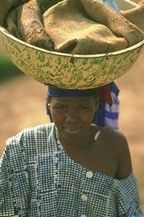Kissi, Northern in Sierra Leone

Photo Source:
Bethany World Prayer Center
|
Send Joshua Project a map of this people group.
|
| People Name: | Kissi, Northern |
| Country: | Sierra Leone |
| 10/40 Window: | No |
| Population: | 69,000 |
| World Population: | 738,000 |
| Primary Language: | Kissi, Northern |
| Primary Religion: | Ethnic Religions |
| Christian Adherents: | 20.00 % |
| Evangelicals: | 16.30 % |
| Scripture: | Complete Bible |
| Ministry Resources: | Yes |
| Jesus Film: | Yes |
| Audio Recordings: | Yes |
| People Cluster: | Atlantic |
| Affinity Bloc: | Sub-Saharan Peoples |
| Progress Level: |
|
Introduction / History
Before the 1600s the Northern Kissi people lived in the Upper Niger region. Around 1600 they migrated west, displacing the local Limba people as they went.
There are two Kissi groups divided by dialect. The Southern Kissi and the Northern Kissi speakers have similar lifestyles.
The Northern Kissi inhabit the thick tropical forests of Guinea, as well as small areas in Liberia and Sierra Leone. They speak a Niger-Congo language called Kisi (or Gizi). For many generations, the Kissi have been known as a hardworking people. They are very age-oriented, dominated and led by the elderly.
To the north of the Kissi are the dominant Mande-speaking tribes. Because the Northern Kissi are neither culturally nor linguistically related to the Mande speakers, they have been politically and economically neglected by the government.
What Are Their Lives Like?
The Northern Kissi are primarily farmers, though they are also famous for their woven crafts. They grow rice as a staple crop on most hillsides and in low, swampy areas. Other crops include peanuts, cotton, corn, bananas, potatoes and melons. They also grow beans, tomatoes, onions, and peppers in small vegetable gardens, and coffee is their cash crop. Most of the farmers also raise some livestock.
Both genders participate in all farming activities. Men also hunt, fish and clear land. The women's duties involve cultivating small vegetable gardens for the family, raising chickens, trading in the local markets and fishing. Boys tend to the livestock, which are usually cattle and goats. They value their cows for use in sacrifices, not for their milk.
Northern Kissis live in small, self-governing villages that are tucked inside groves of mango or kola trees. Each village is compact. They raise their home slightly above the ground. These are round with mud walls, cone-shaped thatch roofs and verandahs. There is a public square in most villages where the headman resides. He offers sacrifices at the village shrine and acts as a judge in disputes.
To the Northern Kissis, a child is not considered "complete" and is thought of as dirty and impure. Therefore, when a boy or girl reaches puberty, they hold a purification ceremony. This ceremony, called a biriye, "cleanses" the child and ushers him into adulthood. They perform this ceremony in a sacred forest. From then on these youths are expected to take on adult responsibilities.
Music has an important role in Northern Kissi culture. Sometimes, they use it to communicate. This kind of music doesn't have a melody; instead, it carries a rhythmic sound with much drumming and whistling.
What Are Their Beliefs?
Some Northern Kissis have converted to Islam, but most of them continue to practice their traditional ethnic religion. Ancestor worship (praying to deceased relatives) is common. The Northern Kissi believe that ancestral spirits act as mediators between them and the creator god. They use small stone statues to represent the spirits. Village headmen worship them and make offerings.
The Kissi constantly live in fear of the supernatural. They wear charms to protect themselves from evil spirits. Sorcerers and witches practice witchcraft. Some elders and religious leaders communicate with spirits through trances and hypnosis.
What Are Their Needs?
The Northern Kissi people need freedom from the spirit world. These spirits have dragged them down in every way. They need freedom in Christ.
Prayer Points
Pray for the Lord to thrust out workers to bring about a complete harvest among the Northern Kissi people.
Pray that God will give Northern Kissi believers the boldness to share Christ and disciple those who decide to follow the Lamb of God who takes away the sins of the world.
Pray that Christian literature, gospel recordings and the JESUS Film will be effectively used among the Northern Kissi.
Ask the Lord to bring forth strong local churches among the Kissi.